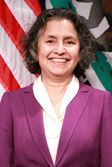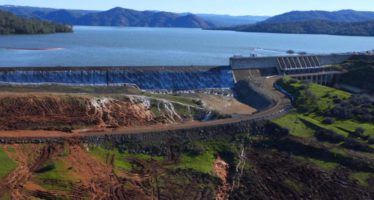Jeanne Raya Failed to Reveal Donations

JULY 25, 2011
By JOHN HRABE
A second member of the California Citizens Redistricting Commission, Jeanne Raya, failed to disclose financial contributions made within the past 18 months to a state political campaign committee, according to documents reviewed by CalWatchDog.com. Ten days ago, CalWatchdog.com first reported Commissioner Gabino Aguirre’s failure to disclose three campaign contributions, one of which was made nine days after the State Auditor completed its background investigation.
The Jeanne Raya revelation raises new questions about the California State Auditor’s background investigation of redistricting applicants, which a high-level commission official described as being “invisible” and a memo from the auditor’s office admitted was “brief” and “routine.”
Raya is listed as the “Agency Principal” on the website for John L. Raya Insurance Agency, Inc. and reported ownership of the company on her 2010 Form 700: Statement of Economic Interests. But she failed to disclose to the commission four donations of $250 made by the company since March 2010.
The state’s former campaign finance watchdog believes that the contributions should have been reported, even though they were made through a business account.
“The applicant should have listed the contribution: a contribution from a business in which you are the principal is a legitimate indicator of political involvement,” explained Dan Schnur, former chairman of the Fair Political Practices Commission, the state agency responsible for administering conflict-of-interest documents. “Someone who contributes to a PAC involves themselves politically just as much as if they had given to a cause.”
Schnur, director of the Jesse M. Unruh Institute of Politics at the University of Southern California, believes that the commissioner’s failure to disclose business contributions could have been a “legitimate misunderstanding” by the applicant. He put the onus on the state’s independent review process to fully bring to light any potential conflicts.
“It’s up to the State Auditor’s Office to determine whether it meets up to the letter of the law,” Schnur said. “In fairness to the state auditors, they are very capable people who don’t have a background in campaign finance.”
The California State Auditor’s office refused CalWatchdog.com’s repeated attempts to clarify whether the Auditor’s office intended for applicants to disclose contributions made through business accounts, or whether state auditors checked for political contributions made by applicants’ businesses.
“The staff checked for contributions made by those 120 applicants and family members,” Margarita Fernández, chief of public affairs for the California State Auditor’s Office, wrote in an email response to CalWatchdog.com. “If something came to their attention they could make additional inquiries.”
Taint of Partisanship
John J. Pitney, Jr., the Roy P. Crocker Professor of American Politics at Claremont McKenna College, believes that the state auditor had an obligation to “go as far as legally possible” to uncover conflicts of interest.
“The whole idea of the commission was to remove any taint of partisanship or self-dealing, ” he said. “The auditor should have gone as far as legally possible in uncovering any potential conflicts of interest.”
A high-level commission official with intimate knowledge of the State Auditor’s review process described the process as “invisible.” The source, who asked not to be identified for fear of retribution by the commission, added that they were “unaware of any check performed beyond reviewing application materials.”
A memo from the State Auditor’s office that was provided to CalWatchDog.com by an agency spokeswoman confirms the anonymous source’s account of the process. The memo refers to the background searches as “routine” and described its own reports as “obviously rather brief.”
The review process by the State Auditor consisted of four key components, all of which relied heavily on information that was self-disclosed by applicants. State auditors started by “performing a routine search for information about every applicant from an established list of public and private sources.” The memo’s appendix lists a “Google search” as the first component of this “routine information search.”
Other steps of the review process included “contacting at least one of the persons who wrote a letter of recommendation concerning each applicant” and “contacting each applicant to try to confirm the accuracy of the information.”
The commission’s supplemental application required applicants to: “List all of the monetary and non-monetary contributions of $250 or more that you have made in any single calendar year during the past 2 years to any professional, social, political, volunteer, and community organizations and causes.”
The State Auditor’s Office established the $250 threshold through regulations, a standard that is lower than state campaign finance laws that require campaign committees to report contributions of $100 or more.
Contributions Are Support
Bradley Smith, a former chairman of the Federal Election Commission, says that the significance of a $100 political contribution can vary based on individual circumstances, financial status or social obligations.
“But clearly it’s a contribution that indicates support, ” explained Smith, a Clinton appointee to the federal campaign agency who now teaches at Capital University Law School. “Only about 2 percent of Americans make political contributions — by definition, contributors of any amount are usually among the most politically active citizens.”
According to the California Secretary of State’s website, John L. Raya Insurance Agency Inc. has made four $250 contributions to the Insurance Brokers and Agents Candidate PAC since March 2010. Two contributions were made in March 2010, followed by two contributions in March 2011.
Under Schedule 2-A of her conflict-of-interest documents, Raya described herself as the company’s “Corp Secretary” with an ownership interest valued between $10,001-$100,000. State law requires officials to disclose any ownership interests of 10 percent or greater.
The failure to disclose political contributions also appears to violate the Commission’s Code of Conduct, which requires commissioners to “disclose actual or perceived conflicts of interest to the Commission.”
Part 1 of the Redistricting Series: “Gabino Aguirre’s Secret Political Past.“
Part 2 of the Redistricting Series: “Did Gabino Aguirre Flout Code of Conduct?“
Part 3 of the Redistricting Series: “Chart Shows Aguirre Conflicts of Interest.“
Part 4 of the Redistricting Series: “Jeanne Raya Failed to Reveal Donations.“
Related Articles
With old warnings unheeded, Oroville Dam problems threaten valley
SACRAMENTO – A Sacramento Bee story published Monday succinctly described the disaster unfolding at the nation’s tallest dam, where
Fighting good fight for freedom!
SEPT. 13, 2010 I, as a nattering nabob, see negativism everywhere. The Legislature manages to do just about everything wrong.
Big Green’s opaque funding
JUNE 30, 2010 By ANTHONY PIGNATARO In the race to pass Proposition 23, the effort to roll back California’s landmark



